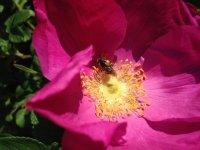1. Time, practice, and understanding the basics of composition will put you ahead of almost all of the people who have spent money on DLSRs and never take them off of auto. Being able to understand how to compose a scene and developing your "eye" for shots is crucial, and only comes with time. Lots of people have good eyes when it comes to photography, but they don't take the time to develop them, and so never really become more than mediocre photographers.
2. Understand your equipment and the limitations of it's ability. A D3400 can do a lot of things and is a excellent platform to learn on, but compared to the higher end models is still somewhat limited in capability. Knowing what it does well and what it struggles to accomplish will help you understand where you may need to look at better glass, or post-processing to get the image you've got in your mind from the one the camera takes.
That brings up another important point. No camera sensor invented will ever be a match for the color processing ability of the human brain. Here's an example: You are standing at the beach watching an amazing sunset, pink and purple clouds roiling at the horizon over an ocean with enough surf to throw dozens of shades of blue and green into the waves as the sun shines through behind them. You start snapping pics, and when you get home to look at them you see that your image is blown out from the sunlight, and the colors look Muddy and muted. That's because the sensor sucks at capturing the depth of color over as broad a range as our brain can process. it's still a machine at the end of the day, and you have to understand it's limitations. You can fix those things with bracketed exposures, some manual balancing, filters, etc, but the image will only be as good as the sensor capturing the light. Don't be discouraged by that, there are options to get it to match what your brain remembers.
3. Learn how to use light to your advantage. A scene lit by hard daylight is dramatically different at sunset or by moonlight, and understanding how the light impacts your scene is crucial to a final product. Understanding how the light works in your scene is critical to photography, since it's at the very core of what you're doing (capturing light).
4. Put some thought into your photos. There's a lot to be said about snapshots and being in the right place at the right time, but try and approach a shoot with a general plan on what you hope to accomplish, and then adapt from there.
5. PLAY! Experiment! Find your own style. 100 people standing in the same place photographing the same object will turn out 100 similar but individually distinct photos. We all see things differently, and as you develop your skill and your eye, you will notice a pattern to your shooting. As you continue to gain skill and experience, your own unique style will appear. You're telling a story in a single image, tell it your way and be happy with it.


























